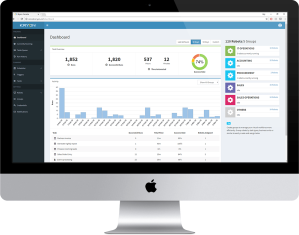Watch all the Transform 2020 sessions on-demand here.
Six titans of industry stood onstage at MIT’s Kresge Auditorium yesterday, assembled to speak on a panel about artificial intelligence (AI), including David H. Koch Institute professor Robert Langer; Helen Greiner, cofounder of iRobot, the Bedford-based company perhaps best known for its line of autonomous vacuum cleaners; Xiao’ou Tang, founder of computer vision startup SenseTime, which last year raised $1.2 billion in venture capital at a valuation of more than $4.5 billion; and Eric Schmidt, former executive chairman of Google.
The discussion capped off a three-day celebration of MIT’s new Stephen A. Schwarzman College of Computing, which will offer its first classes in physics, economics, biology, economics, machine learning, and related disciplines this fall.
The panelists shared thoughts on a range of topics, but one they repeatedly touched on was entrepreneurship. Entrepreneurs, Schmidt argued in his opening remarks, drive the economy — they’re spigots for ideas that form the basis of industries. “[Founders are] people who are filled with a vision — something they care about — and they personalize it, they believe in it, and they convince others to follow them,” he said.
But, he said, they’re in “need [of] more juice.”
June 5th: The AI Audit in NYC
Join us next week in NYC to engage with top executive leaders, delving into strategies for auditing AI models to ensure fairness, optimal performance, and ethical compliance across diverse organizations. Secure your attendance for this exclusive invite-only event.
Schmidt was referring to the AI talent shortage in the U.S. — one that’s motivated tech giants like Facebook and Google to offer computer scientists with AI expertise multimillion-dollar salaries and hire talent from well beyond U.S. borders. According to a report by Chinese technology company Tencent, there are about 300,000 AI professionals worldwide, but “millions” of roles available. Moreover, close to 54 percent of chief information officers view this skills gap as the biggest challenge facing their organization.
Institutions like the MIT — and Carnegie Mellon University’s AI undergraduate degree program — can help turn things around, according to Techstars managing director Katie Rae, who leads MIT’s The Engine startup accelerator. She says that around 90 percent of MIT students now take at least one computing course, and around 40 percent are pursuing a computer science major.
“So many kids want to be computer science majors,” Rae told members of the press. “We’ve got to look at some scaled ways that people in other majors can … get a computer science minor or something.”
Massive open online courses, or MOOCs, offer a path to access to that sort of education. Toward that end, Andrew Ng, a computer scientist who led Google’s AI division, Google Brain, and formerly served as vice president and chief AI scientist at Baidu, recently launched ‘AI for Everyone,’ a new Coursera program aimed at business professionals.
Ng’s first machine learning course has enrolled more than 1.7 million students to date.
“We know that entrepreneurs drive the economy,” Schmidt said. “What do you need to have [AI] companies? You need entrepreneurs. And let me tell you: we need more entrepreneurs.”
For AI coverage, send news tips to Khari Johnson and Kyle Wiggers — and be sure to bookmark our AI Channel.
Thanks for reading,
Kyle Wiggers
AI Staff Writer
P.S. Please enjoy this video from this week’s celebration of MIT’s College of Computing.
From VB

UiPath is considering launching its own conversational AI platform
Robotic process automation company UiPath may create its own conversational AI platform for workplace bots, CPO Param Kahlon told VentureBeat.

AI helps turbine-inspecting drones pinpoint their locations
In a new research paper, scientists describe an AI system that helps turbine-inspecting drones pinpoint their locations in space.

Microsoft combines AI and humans to boost cloud security with Azure Sentinel and Threat Experts
Microsoft is combining AI with human expertise to boost its cloud security with two new products: Azure Sentinel and Threat Experts.

Mozilla updates Common Voice dataset with 1,400 hours of speech across 18 languages
Mozilla’s updated Common Voice dataset contains more than 1,400 hours of speech data from 42,000 contributors across more than 18 languages.

Kryon raises $40 million for robotic process automation
Kryon, a robotic process automation startup headquartered in San Francisco, has raised $40 million in series C financing.

Android Messages gets Google Assistant suggestions
Google Assistant is bringing suggestions for weather, restaurants, and movies to conversations in Android Messages, Google said today.

Google works with Aravind Eye Hospital to deploy AI that can detect eye disease
Google says it’s deployed an algorithm that can detect diabetic retinopathy in Aravind Eye Hospital in India, in partnership with Verily.
Beyond VB
The World’s Biggest Banks Are Doubling Down On Artificial Intelligence
When we think of companies at the forefront of technological innovation, global financial institutions don’t come to mind. However, with AI going mainstream, even the gatekeepers in the financial sector can’t afford to ignore them. (via Forbes)
China’s Tech Firms Are Mapping Pig Faces
As a devastating disease afflicts the country’s swine, companies are scrambling to roll out facial and voice recognition and other unproven ways to save them. (via New York Times)
The US Army wants to turn tanks into AI-powered killing machines
A human being will still make the final decision to fire, the Pentagon says, even with autonomous targeting capability. Critics fear that won’t last forever. (via Quartz)
Why AI is a threat to democracy—and what we can do to stop it
Futurist and NYU professor Amy Webb on an impending artificial intelligence catastrophe—and why there’s still hope it can be averted. (via MIT Tech Review)


